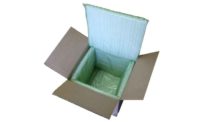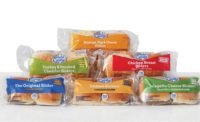Refrigerated & Frozen Foods' 30-Year Anniversary Coverage: Revisiting Reser's
We check in with Reser’s Fine Foods, the subject of our January 2012 cover story.

R&FF’s January 2012 cover. Reser’s President and CEO, Mark Reser (center) has helmed the company since 2006.
When Reser’s Fine Foods was featured on our January 2012 cover, the company was undergoing significant growth and expansion of its manufacturing and R&D facilities, product lines, and acquisitions of other brands and property, along with a corresponding increase in staffing to handle that growth, employing 3,700 people at the time.
Since then, the company has been a regular presence on Refrigerated & Frozen Foods’ Top 25 Refrigerated Foods Processors Report in the Prepared Foods category (although the company also makes frozen products) and continues to produce dozens of new and classic dishes under instantly recognizable names like Main St. Bistro, Stonemill Kitchens, Don Pancho, and Reser’s signature deli salads and sides.
“We’ve been busy! We now employ approximately 4,000 people and have been adding manufacturing capacity across all our categories to keep up with demand,” says Danielle Katcher, senior director of marketing at Reser’s. “In 2015, we greenfielded a state-of-the-art salads and dips plant in Hillsboro, Oregon. Shortly thereafter, we broke ground in Topeka, Kansas on another new salads and dips plant, which opened in 2018. That same year, we opened a new distribution and meal kit facility in Vista, California, and in 2019, we expanded our tortilla baking capacity by adding new equipment at our Salem, Oregon and Halifax, North Carolina plants.”
The company also just finished rebuilding a baked entrée and side dish plant on their Topeka campus, and expanded capacity there for hotfill side dishes. While Reser’s is constantly innovating new products, “the total number of items we produce hasn’t changed much since 2012. We’re mindful about the cost at our plants, so if an item isn’t working, we discontinue it and move on,” Katcher says. “While some of our top-selling items are still those that launched our business back in the 1950s, like our legendary Reser’s Potato Salad, many newer innovations have quickly become top-selling items, such as meal kits and our Main St. Bistro Baked Scalloped Potatoes.”

Reser’s currently has 14 manufacturing and distribution facilities, including the Century Plant (above) in Hillsboro, Oregon, where salads and dips are made.
Salad Days
Speaking of Reser’s Potato Salad, the origins of the company can be traced back to that particular product. Reser’s story began in 1950 when Mildred and Earl Reser started hand-making their namesake potato salad at their farmhouse in Cornelius, Oregon, subsequently distributing it to Safeway stores throughout the state.
The ascension of the family-run brand was swift after that. Mildred and Earl’s son Al became president of the company in 1960, incorporating the business and moving its headquarters to Beaverton, Oregon (also the home of Nike’s HQ) while building the business up to $600 million annually by 2006. Al turned Reser’s over to his son Mark that year, who still heads the company today as Reser’s president and CEO. Reser’s declined our request for current sales figures, but at the time of our 2012 cover story, the company had approximately $1 billion in annual sales.

Reser’s flagship product — their iconic potato salad — was introduced in 1950 and remains among the company’s top-selling items in 2020.
Logical Logistics
As mentioned earlier, Reser’s invests a significant amount of resources into building and updating its manufacturing and distribution facilities, which improves food safety and speed to market for Reser’s products. Those two areas are perhaps more important than ever with cold supply chain challenges from the COVID-19 pandemic this year, and the ever-evolving avenues for how Reser’s products reach their destinations.
“While delivery of refrigerated foods is still fairly new, the current health crisis has created a sharp increase in demand. In addition to delivery and curbside pick-up, we’re also seeing new activity at brick and mortar stores, including expanding foodservice offerings and meal kits in-store,” notes Katcher. “We believe some of the shifts we’re seeing related to e-commerce will persist after the pandemic is over. While consumer preferences may be challenging to predict, the underlying motivator continues to be convenience, and we deliver that in multiple ways.
“Because the vast majority of our products are fresh, with limited shelf life, our manufacturing and distribution facilities and processes need to provide flexibility and scalability,” Katcher continues. “We built and continue to expand our plants in geographically diverse locations so our customers get the freshest products, exactly when they need them.”
Packaging is another element Reser’s has refined since 2012, including sourcing special trays that work with the company’s new roasting process for products like Roasted Garlic & Rosemary potatoes; changing to a more “dippable” tub for their Stonemill Kitchens dips; and streamlining containers for a more modern look on Reser’s American Classics deli salads line.
“Package graphics are also critical because it’s sometimes the first interaction a consumer has with our products, so there’s a lot of information to communicate in limited space. We ask consumers what they need to know when making a choice at the shelf, and make sure that information is clearly represented on our packages and labels,” Katcher explains.

“No matter how much we may need to change in the future, our core values of quality, customer care, treating employees like family, and giving back, will remain the foundation of who we are,” says Reser’s Danielle Katcher.
Supporting Staff and Communities
Even before the coronavirus pandemic this year, labor has been an ongoing concern for food manufacturers, in both recruiting and retention. In response, Reser’s has put programs in place to help attract and retain a high-quality workforce both before and after 2012.
“We’ve started doing interviews with newer employees to check in and get an understanding of what’s working for them and what they might like to see changed. Also, when building or expanding our plants, we create welcoming spaces like large, bright cafeterias, and outdoor patios used for employee breaks and events,” says Katcher.
Reser’s has also emphasized giving back to the communities that support them throughout its 70-year history, so when COVID-19 impacted the basic needs of people around the country, Reser’s responded.

“Our Reser’s Cares Teams are made up of local employees empowered to review and support needs near their facilities,” Katcher says. “These teams provide support to more than 900 community organizations and schools. During COVID-19, we’ve seen the need for food donations increase. We’ve been proud to provide much-needed support to local seniors, schools and food banks throughout the crisis, and build strong networks with organizations who can safely distribute our donated refrigerated foods.”
Looking ahead to the next 70 years, those at Reser’s say they’ll continue to innovate their product lines and further refine efficiencies for how those products are created, packaged and delivered, but “no matter how much we may need to change in the future,” says Katcher, “our core values of quality, customer care, treating employees like family, and giving back, will remain the foundation of who we are.”
To see the original 2012 Reser’s cover story and plant tour, click HERE.
Looking for a reprint of this article?
From high-res PDFs to custom plaques, order your copy today!







